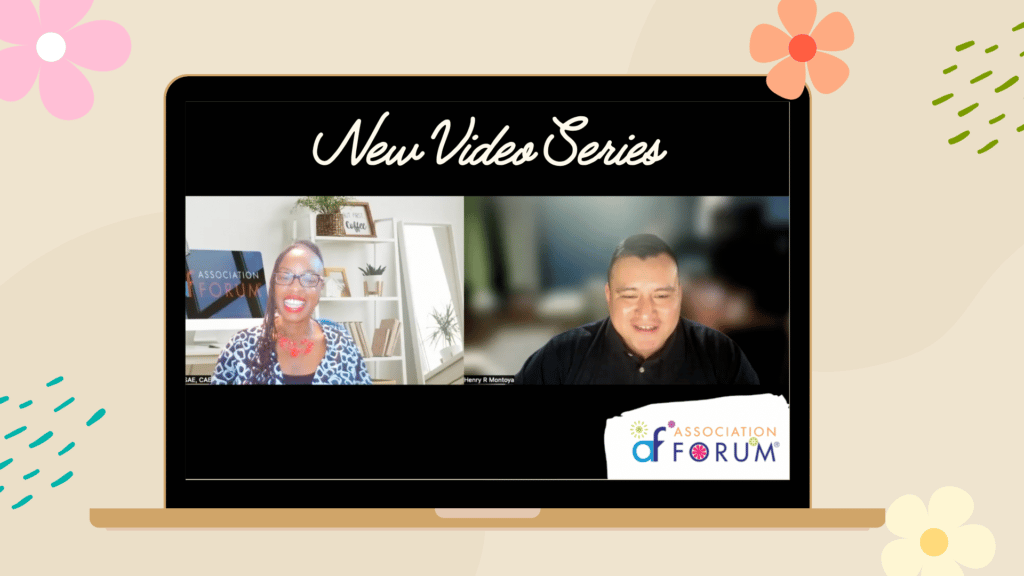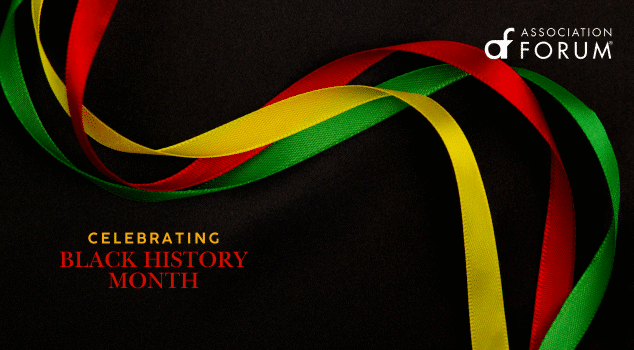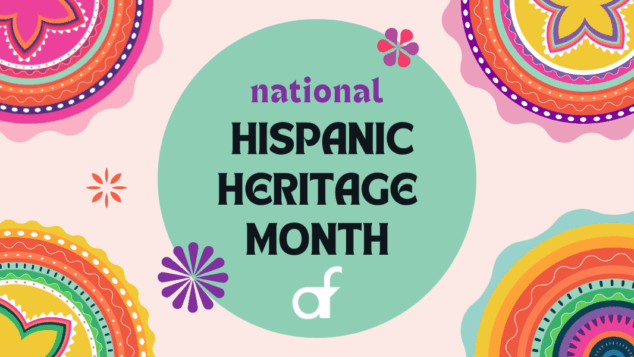VIDEO | Henry Montoya on How Associations Can be More Inclusive of Latinx Professionals

We hope you’re enjoying our coverage of Hispanic Heritage Month. If you’ve missed our resources post or the first interview in this video series, we urge you to check them out! Association Forum is celebrating the month by speaking with Latinx association professionals on their unique journeys to the industry. Henry Montoya is the senior manager of operations and impact for the Association of Latino Professionals for America (ALPFA). Montoya is a veteran and found his way to association management through a unique path–he was a member before joining the team.
Watch the video below to find out more about Montoya’s career journey and how his heritage plays a role in his work.
Read the Transcript
Artesha Moore: Hello, I’m Artesha Moore, president and CEO of Association Forum. Today, I have Henry Montoya here to talk about what Hispanic Heritage Month means to him. First, I’ll ask Henry to introduce himself.
Henry Montoya: Hi, good morning. Thank you, Artesha. My name is Henry Montoya. I’m senior manager of operations and impact at ALPHA, Association of Latino Professionals for America. And that’s my introduction.
Artesha Moore: Thank you for that, Henry. And one of the things in getting to know you a little bit that I’d like to talk to you about is your journey into association management, because I think you have a very unique and interesting story. So tell us a little bit about what brought you to your current role. How did you get there?
Henry Montoya: Yeah, definitely. So I was in military, in the Marines specifically for seven years, active duty coming back to Chicago. I decided to go back to school after trying a few jobs, and I was looking for professional networks to join. I went to a few networking events, and then I don’t know why, but then I started looking specifically for Hispanic networks to see if there’s any opportunities there as well. And I came across this organization called [Spanish Ascend] in Chicago, and they did an event with ALPHA. So I was volunteering with Ascend, and they made an introduction to somebody that was there from the organization. And at that time, I was studying finance at DePaul university. So they told me this is a great organization to join for accounting and finance professionals, and their first event or the next event that was actually available was their annual conference in Phoenix in 2008.
So I pretty much spent my savings there, went there to see what it was all about. I was really blown away by just how good the event was. It was the first time I’ve met so many Latino professionals in person, in one location.
Growing up, I just never had that exposure. Maybe one or two here and there, but to see so many in one place, very articulate, very well presented and professional, I was like, this is the organization I want to be a part of. This is the type of association, network, people I want to connect with.
So when I came back to Chicago, I raised my hands to see where can I volunteer? How can I help? I want to be part of this network, connect with people more. I joined their philanthropy committee at that time, and then from there over the years, it evolved. It became part of their local chapter board for a few years. And over time, the organization also involved beyond accounting and finance to open it up to other Latino business professionals. And then eventually, focusing on developing Latino leaders of character.
During the times I graduated simultaneously, I was going through school, graduated, started different career paths, and I started settling into Last and to Salesforce, Salesforce professional. I was working at a global links company, and I found out that the organization acquired 10 free licenses from Salesforce, but not many people knew about how to configure it or what’s next, how to use it. And I was like, this is what I’ve been learning. And I’ve been wanting the organization to evolve technology, and it was to a point where it was becoming frustrating. So when I saw that they were going in that direction, a lot of things started popping in my head.
I was like, there’s a lot I can do here, a lot I can help with, because I both know the organization, at least at that time, I thought I knew pretty well, but I knew it really just from a local level. But once I came in as part of staff in 2018, I realized it was pretty much almost like a startup because of the so many changes that was going on. It was a startup organization operationally, but the brand has been there for over 50 years. Well, we hit the 50 year anniversary last month.
But operationally, we were just a startup and building a lot of stuff. The impact was also there for the past 50 years. So we’ve continually made impact, but it’s always with a lot of effort from our volunteers, from the staff, putting things together. And I feel like right now is where we’re starting to build a lot of these foundations, bringing in new technology, making sure they’re integrating with each other and focusing more on how our new members’ experiences are going to be, or how the new member experience is going to be and taking us to the next level of actually measuring the impact that we actually have in the community and being able to scale up.
Artesha Moore: Yeah. Henry, thank you for telling that story. And I know that we were here to talk about the heritage month really, but I thought that it was really interesting because you have a very unique story of going from volunteerism to staff and being able to bring that forward. I also think threaded through your story is the power of representation and having a supportive leadership community.
So I have a few questions just to ask you for some reflection from your standpoint and knowing your community and even the story that you just gave us about your career path. What does Hispanic Heritage Month mean to you?
Henry Montoya: For me now, it’s an opportunity to try to promote that diversity within our own community. I think we are very, very diverse within our own community. Not all of us are being represented. So for me, it’s being authentic about myself. How am I? I feel like I’m a mix of my heritage, a mix of not necessarily assimilation but of my environment. I’m also a veteran too, which is a different environment. My interests are different than other peoples. I’m more into technology. I think there’s generational differences too.
An example, being a lot of males growing up, I think back in the day, they were always tinkering with their cars and stuff. Whereas nowadays, I feel it’s like the people I run into are tinkering with their computers, how to split that up instead. In particular within the gaming community. So I think there’s generational differences as well within our community. And for me, Hispanic Heritage Month is a way to encourage others to bring that out when they’re part of committees and share them. How can you share that outward?
Artesha Moore: Thank you for touching on so many wonderful things. I think the one thing that I took from your comments about the levels of diversity within a community, that resonated with me and thank you for calling that out, because there is times when we get to national identity heritage months, that it does become very stereotypical, bland, not the richness and diversity that really is represented within this large community, lots of different regions globally. So thank you for calling that out.
And I’m a techie two. So when I took over technology strategy in 2008, I was one of very few women, one of only few Blacks in this particular one. And to be both, it was otherized, but I tinkered with things growing up. My mom bought me a telephone so I could take it apart and tinker. So that really resonated with me. And I think as we move forward, one of the things that I continue to lean into is the need for leadership within our community, to be more inclusive of different ways of coming about it.
You hit on another theme in the diversity wheel that doesn’t get talked about a lot. Veterans. There’s a huge workforce that is coming from the military that has a lot of value, technology, strategy, development, people management skills, mobilization that would benefit in decision making. So my question for you, Henry, is how can the association industry become more inclusive to the Latinx community and it’s leaders?
Henry Montoya: I think one of the goals there is how to make things more welcoming. How do you build a community within your culture, within work? How do you make sure people are bringing their authentic self? How are you not knocking on failure, but actually encouraging it for innovation? I think it’s almost like just any best practices in creating a good company culture is allowing for the diversity to grow within the organization.
It doesn’t even have to be necessarily a particular demographic like Hispanics in general, but even non-Hispanic, there’s diversity there too. And allowing people to bring these different backgrounds into the environment is what I think people would like that. It’s like, oh, that’s a new idea. It motivates you to come to work because you know you’re good with what you bring. But also that curiosity to learn from others that you couldn’t have experienced it from your background, but there’s a lot of value in learning from others there.
Artesha Moore: Thank you for that. And thank you for your thoughtfulness around it, because I know that you had a jewel there that you wanted to get out, .and you brought it that whole human piece and that there’s diversity in so many levels, even from the surface and going in.
So being a member and a leader within the Latinx community, that you’re a veteran. You’re from a certain region, you’re bringing experiences. You like technology, you understand how the gaming system works and how to drive a business forward. There’s somebody else who has something else and this beautiful fabric for me, I think is why I’m inspired to be here in Chicago to learn about this community and so many of these diverse leaders that are really driving change within our industry.
So my last question for you before I let you get out of here for a good holiday weekend, is who do you admire and look up to? Who are your heroes?
Henry Montoya: Who do I admire? I think that changes depending on what my goals are. Year after year, it can change. It’s usually I’m interested in this particular thing. Who’s involved with this? Who is the one who’s been grinding it for years and is the subject matter expert and knows about it? And then I try to learn what do they do? What are the steps?
So currently right now are those that have made those transitions from working at an organization to opening up their own business on the side. I’ve tried entrepreneurship myself a few times. I still want to get back into it, and I admire a lot of entrepreneurs. Those that are not only the well known ones that are successful, but those that are quiet, that have built systems in place that it really allowed in this scale.
Artesha Moore: Thank you for that. And I like what you said about fitting what you are focused on and vision to look at who you admire based on that. Because it does evolve over time. You have some heroes that have stayed, tried and true with you. And then there’s new that come in based on your likes and focus and big ups to entrepreneurship. There’s a lot of opportunity to take what we’ve learned in associations to drive other areas of business.
So this is fantastic. Henry, thank you so much for spending this time with me today. Your statements and comments and just sharing will help others who maybe don’t see themselves in leadership and maybe want to try something new or just show up and be their whole selves at work. So thank you for that.
Henry Montoya: Thank you, Artesha.
Tags
Related Articles
BAE Chicagoland Kicks Off: Join the Movement!
Black Association Executives (BAE) is officially in Chicagoland, bringing a bold new community to Black...
Celebrating Hispanic Heritage Month with Association Latinos
How to celebrate Hispanic Heritage Month within the association community and Chicago!
Tips for Creating a Welcoming Meeting Environment
Creating a truly inclusive annual meeting means going beyond ADA compliance—discover how one association builds...




